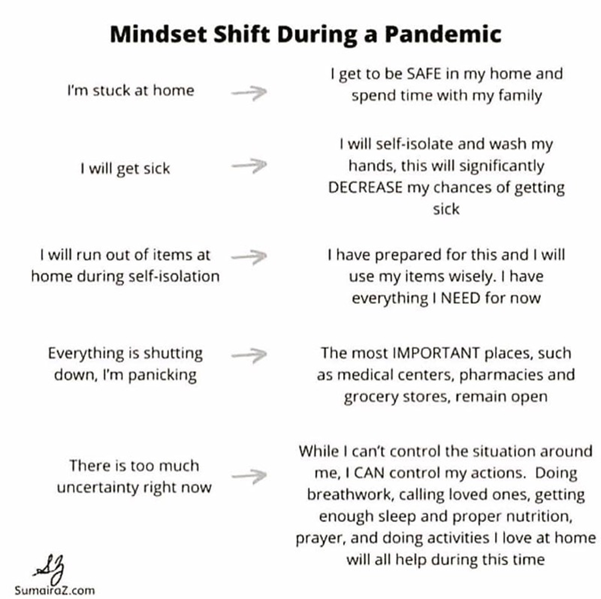Wellbeing

Dear Killester Families,
There is a wealth of information in the community, news media and social media and sometimes it is a challenge to discern and decide what is the best advice. It is best to keep information and messaging short and simple - there is enough confusion each night on our news services. I would like families to read the "best of" material that I have been receiving in my email inbox each day. I think there is something for every one here for support and encouragement during these uncertain times.
Wishing all families the best during the next three weeks - that you support each other, be patient with each other and reach out to those in your community who may need some extra support.
This reflection by Lynn Ungar may help you center and reflect on these time as we approach Easter.
Pandemic
What if you thought of it
as the Jews consider the Sabbath -
the most sacred of times?
Cease from travel.
Cease from buying and selling.
Give up, just for now,
on trying to make the world
different than it is.
Sing. Pray. Touch only those
to whom you commit your life.
Center down.
And when your body has become still,
reach out with your heart.
Know that we are connected
in ways that are terrifying and beautiful.
(You could hardly deny it now.)
Know that our lives
are in one another’s hands.
(Surely, that has come clear.)
Do not reach out your hands.
Reach out your heart.
Reach out your words.
Reach out all the tendrils
of compassion that move, invisibly,
where we cannot touch.
Promise this world your love -
for better or for worse,
in sickness and in health,
so long as we all shall live.
Ms Luana Doko
Student Wellbeing Leader
How to Keep the Greater Good in Mind During the Coronavirus Outbreak
In the midst of our panic around COVID-19, we must look to each other to help us get through it. Why expect more cooperation and compassion in the face of an epidemic? Because, contrary to popular belief, crises often tend to bring out the best in people. Not long ago remember how the Australian community banded together in the wake of our devastating bushfires.
When we face a common enemy, like an epidemic, we are more likely to pull together for the benefit of everyone. Notice how many young and healthy people are taking seriously the need to wash their hands frequently, cover their mouths when they cough, stay home when sick, or wear masks when in public. Sure, no one wants to get sick—but, at the same time, no one wants to be responsible for making others sick. In fact, research shows that protecting others is a huge motivator for doing the right thing. In fact, it may simply be human nature to be kind and helpful when others need us.
Of course, not everyone acts altruistically in these situations. So, what makes it more likely they will, and how can we use that to our advantage? Here are four ways we can support others in fighting the virus.
1. Look to the heroes
There will always be heroic efforts in a disaster — people who sacrifice themselves for the good of others. Think of the health care workers who are treating people infected with this virus at great personal risk.
Or
infected with the virus who voluntarily isolate themselves for weeks to protect the public. When we hear stories of these people, we feel what a warm feeling inside that inspires us, fueling optimism and a desire to act altruistically ourselves. While the temptation might be to focus on fear and everything going wrong, we can redirect our attention to those who are doing the right thing, which will lead us to be better citizens ourselves.
2. Stay calm and focused
It’s easy to be lost in fear when disaster strikes. However, it doesn’t help anyone to stir up panic about the situation, because we don’t think as clearly when we are in emergency mode. You can see how this has played out already, as people have been stockpiling masks and toilet paper and creating a shortage that could affect the people who truly need them — those who are sick and need masks to avoid spreading the disease to the rest of us.
How can we stay calmer and make wiser choices? One way is to use whatever tools you have at your disposal for keeping a cool head—like practicing mindfulness, which has been shown to both lessen anxiety and help us make better decisions We might take a walk in the park and let nature soothe us. Or we could talk to a friend — a calm friend, that is — who can help us reduce our anxiety.
Of course, our normal ways of connecting socially — like singing together at a concert or going to large parties have to change. But whatever we can do to maintain an air of calm, and to spread it to those around us, the better. After all, our emotions tend to be contagious in our families, and we should do our best to keep fear and panic contained.
3. Show gratitude
One of the kindest things we can do is to say “thank you” to those who are doing what they can to fight the outbreak. When we show gratitude toward others, we let them know that their actions matter, which encourages more of the same kind of behaviour — not only toward the grateful person but to others. Creating a cycle of altruism is helpful when we are faced with a challenge that affects us all, helping to foster trust in each other and care for each other’s plight.
4. Remember our common humanity and show compassion
When we are fearful, our first instinct might be to cast blame on others or to indulge in prejudice toward groups we see as responsible. Though we might rationally know that no one person or country can be blamed for a viral outbreak, our minds still seek simple explanations.
Research suggests that when we recognize our common humanity and show compassion, we are more likely to pull together and to solve issues that may be complex in nature. You can start by giving yourself some compassion, which can help you become more willing to admit mistakes and take steps to correct them. This is important, as human error can be costly when there is a viral outbreak, and we need to work together to learn from our mistakes.
Of course, all of these guidelines don’t supplant the importance of practicing good hygiene. We need to continue to frequently wash our hands and avoid touching our faces, so that we can lessen the chance of infecting ourselves and others. But we also should remember our social hygiene—looking for the heroes, staying calm ourselves, being grateful, and remembering our common humanity. In this way, we can help to make the world safer for all of us
Excerpts from Jill Suttie – Greater Good Science Centre, Berkeley, California
Monitoring your Mindset
In time like this we are prone to worrying thoughts. Below are some helpful hints to guide you to "reframe" and shift to the positives.


